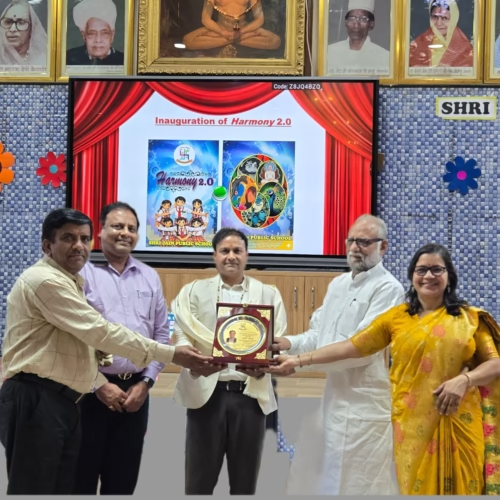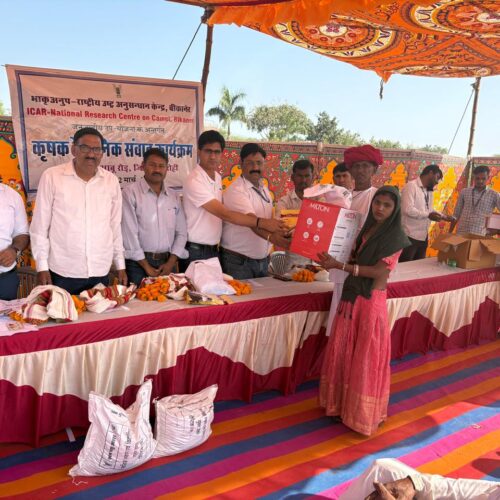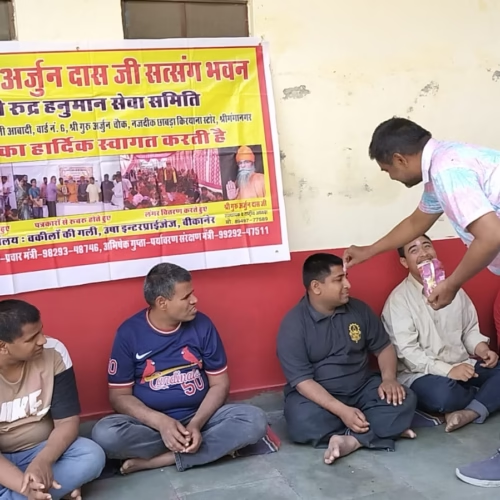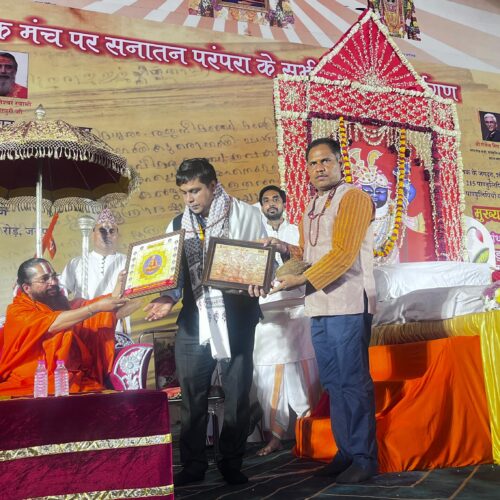Professor Mamta Sharma of Alwar Represents the District at International ‘Harit Aastha’ Conference in Khejadli
Delivers Compelling Lecture on Environmental Conservation and Human Health
Jodhpur | September 2025
It was a moment of pride for Alwar district when Professor Dr. Mamta Sharma of Raj Rishi Autonomous College, Alwar, represented the region at the prestigious international conference “Harit Aastha” (Green Faith), organised by Jai Narain Vyas University, Jodhpur. The three-day conference, held from 1 to 3 September 2025 at the historic eco-heritage site of Khejadli, brought together academicians, researchers, and environmentalists from India and abroad to deliberate on sustainable living and ecological preservation.
The Historical Significance of Khejadli
Khejadli is not just another village in Rajasthan—it is a landmark in India’s environmental consciousness. The site holds a deep symbolic and cultural legacy that dates back nearly three centuries. In 1730, under the leadership of Amrita Devi Bishnoi, 363 men and women of the Bishnoi community sacrificed their lives to protect khejri trees from being felled by the king’s men. Their defiance carried an immortal message:
“If a tree is saved, even at the cost of one’s head, it is a noble sacrifice.”
The magnitude of this sacrifice was such that the then ruler was forced to revoke the order of tree cutting. The Bishnoi community’s unwavering commitment to environmental protection has since become a timeless example of harmony between humanity and nature. Today, Khejadli stands as a sacred site of ecological faith and resilience, reminding society of the power of collective sacrifice for a greater cause.
Dr. Mamta Sharma’s Lecture
At the conference, Dr. Mamta Sharma delivered a powerful and deeply researched lecture on “The Impact of Deforestation and Pesticides on Human Health.” Her presentation drew attention to two of the most pressing ecological crises of the modern era.
She emphasised that unchecked deforestation is not only destroying biodiversity but also undermining the very life-support systems of the planet. Forests, she said, are the lungs of the Earth, and their depletion is directly impacting the quality of air and overall ecological stability.
Equally concerning, Dr. Sharma highlighted, is the rampant use of chemical pesticides. While these substances are promoted as solutions for agricultural productivity, their excessive and indiscriminate application has left a toxic imprint on soil, water, and food chains. “Pesticides are silently infiltrating our bodies, increasing the burden of chronic illnesses, cancers, and genetic disorders,” she observed, underscoring how environmental damage and public health crises are deeply interconnected.
Her lecture resonated strongly with the gathering, sparking meaningful dialogue among attending scholars, researchers, and activists. Delegates praised the depth of her analysis and her ability to connect historical traditions with contemporary scientific discourse.
The Broader Relevance of the ‘Harit Aastha’ Conference
The Harit Aastha conference was not just an academic exercise; it was a moral and cultural reminder of India’s ecological heritage. Experts noted that the values upheld by the Bishnoi community centuries ago remain deeply relevant in today’s world, where industrialisation and urbanisation have put unprecedented pressure on natural ecosystems.
Sessions at the conference covered diverse topics including climate change, sustainable agriculture, traditional knowledge systems, and ecological ethics. A recurring theme was the urgent need to align modern development with ecological balance, a principle that the Bishnoi legacy embodies. Scholars pointed out that sustainable development is not merely an option but a survival imperative, and communities must be made aware of their role in protecting the environment.
Alwar’s Pride and Rajasthan’s Legacy
Dr. Mamta Sharma’s participation at Khejadli symbolised a bridge between Rajasthan’s glorious past of environmental heroism and its present challenges. For Alwar, her contribution became a source of collective pride, showcasing how intellectual leadership from the district is shaping national and international conversations on ecological well-being.
Her intervention also reflected how Rajasthan, often stereotyped as a land of deserts, actually carries some of the most profound traditions of environmental ethics. The Bishnoi ethos, rooted in the soil of Marwar, has long served as an inspiration for global conservation movements.
Looking Forward: A Call for Renewed Ecological Faith
The conference concluded with a collective call to action, urging governments, communities, and individuals to treat ecological preservation as a spiritual and social responsibility, not merely a policy agenda. Delegates affirmed that humanity must learn from the Bishnoi sacrifice at Khejadli—that true faith is not only in temples and rituals but also in protecting the trees, rivers, and biodiversity that sustain life.
As Dr. Mamta Sharma’s address demonstrated, the issues of deforestation and pesticide abuse are not isolated scientific concerns—they are existential threats that demand both grassroots awareness and global cooperation. Her voice at the Khejadli conference added weight to a growing movement that insists the future of human civilisation rests on reviving the principles of “Harit Aastha”—Green Faith.
For Alwar, for Rajasthan, and for India, her presence marked not just representation but leadership—anchoring local pride in a global ecological narrative.
अलवर की प्रोफेसर डॉ. ममता शर्मा ने खेजड़ली अंतर्राष्ट्रीय सम्मेलन में किया जिले का प्रतिनिधित्व
पर्यावरण संरक्षण और मानव स्वास्थ्य पर रखा प्रभावशाली व्याख्यान
जोधपुर | सितम्बर 2025
अलवर जिले के लिए यह गर्व का क्षण रहा जब राज ऋषि स्वायत्त महाविद्यालय, अलवर की प्रोफेसर डॉ. ममता शर्मा ने जय नारायण व्यास विश्वविद्यालय, जोधपुर द्वारा आयोजित अंतर्राष्ट्रीय सम्मेलन “हरित आस्था” में जिले का प्रतिनिधित्व किया। यह तीन दिवसीय सम्मेलन 1 से 3 सितम्बर 2025 तक पर्यावरणीय विरासत स्थल खेजड़ली, जोधपुर में संपन्न हुआ, जिसमें देश-विदेश से पर्यावरणविद्, शिक्षाविद् और शोधकर्ता शामिल हुए।
खेजड़ली का ऐतिहासिक महत्व
खेजड़ली राजस्थान ही नहीं, बल्कि पूरे भारत की पर्यावरणीय चेतना का प्रतीक स्थल है। सन् 1730 में अमृता देवी बिश्नोई के नेतृत्व में 363 बिश्नोई स्त्री-पुरुषों ने खेजड़ी वृक्षों की रक्षा के लिए अपने प्राण न्यौछावर कर दिए थे। उनका अमर संदेश आज भी गूंजता है—
“सिर साटे रुख रहे, तो भी सस्तो जाण।”
(सिर कट जाए तो भी कोई बात नहीं, पेड़ न कटे।)
यह बलिदान इतना प्रभावशाली था कि तत्कालीन राजा को पेड़ों की कटाई का आदेश वापस लेना पड़ा। बिश्नोई समाज का यह त्याग पर्यावरण संरक्षण और आस्था का अद्वितीय उदाहरण है, जो आज भी संपूर्ण मानवता को प्रेरणा देता है।
डॉ. ममता शर्मा का व्याख्यान
सम्मेलन में डॉ. ममता शर्मा ने “वनों की कटाई और कीटनाशकों का मानव स्वास्थ्य पर प्रभाव” विषय पर अपना गहन शोध-आधारित व्याख्यान प्रस्तुत किया।
उन्होंने बताया कि—
- अंधाधुंध वनों की कटाई हमारी जैव विविधता को नष्ट कर रही है और जीवनदायी वायु पर संकट खड़ा कर रही है।
- कीटनाशकों के अत्यधिक प्रयोग से मिट्टी, जल और खाद्य श्रृंखला प्रदूषित हो रही है, जिसका सीधा असर मानव स्वास्थ्य पर पड़ रहा है।
- इन खतरों के कारण कैंसर, हृदय रोग और आनुवांशिक बीमारियों जैसी गंभीर समस्याएं तेजी से बढ़ रही हैं।
डॉ. शर्मा के विचारों ने सम्मेलन में उपस्थित शिक्षाविदों, शोधकर्ताओं और पर्यावरणविदों पर गहरा प्रभाव डाला।
सम्मेलन की प्रासंगिकता
“हरित आस्था” सम्मेलन केवल अकादमिक चर्चा नहीं था, बल्कि एक नैतिक और सांस्कृतिक संदेश भी था कि सच्ची आस्था पेड़-पौधों और प्रकृति की रक्षा में निहित है।
विशेषज्ञों ने माना कि बिश्नोई समाज का त्याग और परंपरा आज भी हमें यह सिखाती है कि विकास तभी सार्थक है जब वह पर्यावरण के साथ संतुलित हो। सम्मेलन में जलवायु परिवर्तन, सतत कृषि, पारंपरिक ज्ञान और पारिस्थितिक आचारशास्त्र जैसे विषयों पर गहन विमर्श हुआ।
अलवर का गौरव, राजस्थान की परंपरा
डॉ. ममता शर्मा की भागीदारी ने न केवल अलवर जिले को गौरवान्वित किया बल्कि राजस्थान की ऐतिहासिक विरासत और वर्तमान चुनौतियों को जोड़ने का कार्य भी किया। मरुस्थल की धरती, जिसे अक्सर बंजर कहा जाता है, दरअसल पर्यावरणीय चेतना और बलिदान की सबसे समृद्ध परंपरा को संजोए हुए है।
भविष्य के लिए संदेश
सम्मेलन का समापन इस सामूहिक आह्वान के साथ हुआ कि पर्यावरण संरक्षण केवल नीतिगत एजेंडा नहीं, बल्कि सामाजिक और आध्यात्मिक जिम्मेदारी है।
डॉ. ममता शर्मा ने यह स्पष्ट किया कि वनों की कटाई और कीटनाशक का दुरुपयोग मानव अस्तित्व के लिए गंभीर खतरा है और इसके समाधान के लिए जन-जागरूकता और वैश्विक सहयोग दोनों आवश्यक हैं।
उनकी उपस्थिति ने यह संदेश दिया कि “हरित आस्था” केवल राजस्थान की धरोहर नहीं, बल्कि सम्पूर्ण मानवता का भविष्य सुरक्षित रखने की दिशा में एक आंदोलन है।











Add Comment